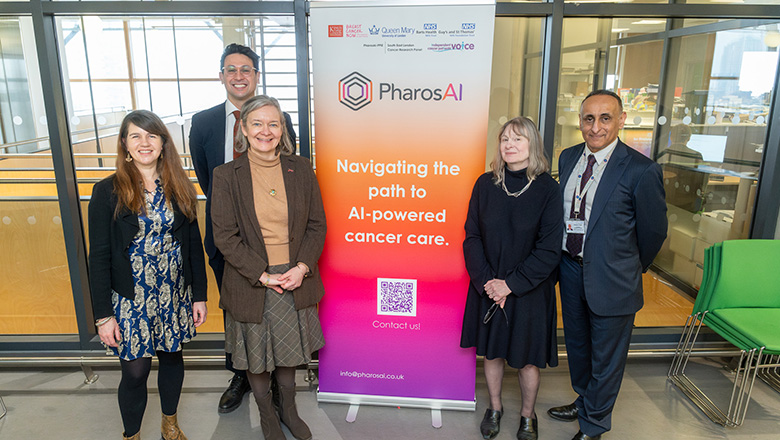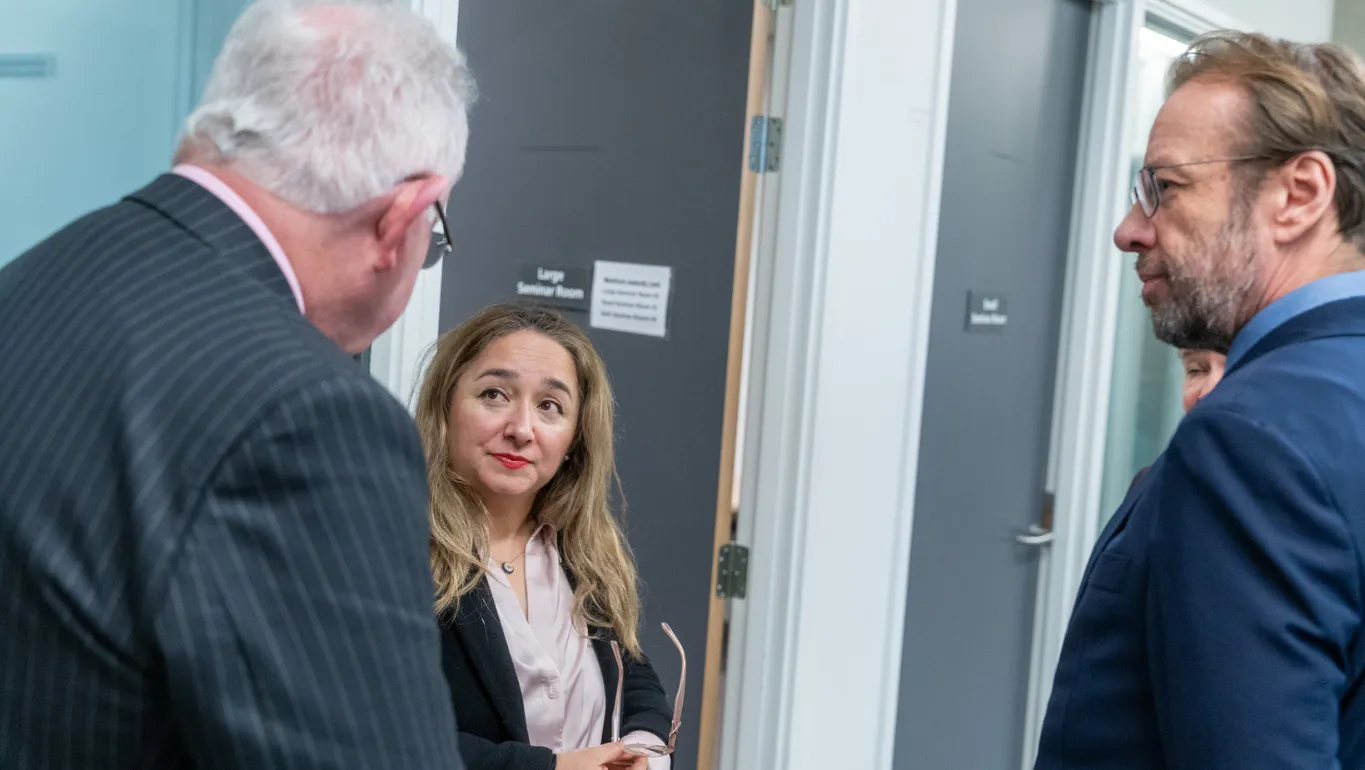AI has the potential to revolutionise cancer care. The UK has a real opportunity to be a major innovator, leading to faster diagnosis, novel and more targeted cancer treatments, and better-informed healthcare for patients.
Professor Anita Grigoriadis, Professor of Molecular and Digital Pathology at King’s and the CEO of PharosAI
11 February 2025
AI minister visits King's to celebrate £18.9 million funding
A ground-breaking research collaboration that will democratise cancer AI research and accelerate the path to AI-powered cancer care has received £18.9 million in funding from the UK Government.

PharosAI, led by a team of researchers and clinicians from King’s, Queen Mary University of London, Guy’s and St Thomas’ NHS Foundation Trust, and Barts Health NHS Trust, promises to transform cancer care by unlocking decades of NHS cancer data and hosting it on one powerful, secure, AI-ready platform.
Minister for AI and Digital Government Feryal Clark MP visited King's Innovation Hub, at Guy's Cancer Centre, this week to celebrate the funding and learn more about PharosAI.
The visit was hosted by Professor Graham Lord, Senior Vice-President (Health & Life Sciences) at King's, with CEO of PharosAI Professor Anita Grigoriadis, Professor of Molecular and Digital Pathology at King’s and Professor Sir Mark Caulfield, Vice Principal for Health for Queen Mary's Faculty of Medicine and Dentistry, and included representatives from the partner institutions and Trusts, and founders of PharosAI.
PharosAI will accelerate the development and deployment of next-generation AI models for cancer diagnosis and drug discovery, leading to faster and better-informed healthcare for UK cancer patients.
The Research Ventures Catalyst funding from the UK Government adds to £24.7 million raised from partners including charities including Breast Cancer Now, Guy’s Cancer Charity and Barts Charity, AI developers, pharma, biotech and technology companies, and public research organisations.

She added: “PharosAI will democratise cancer AI and create an ecosystem to navigate the path to AI-powered precision medicine. The RVC programme allows us to build a unique operational approach between two leading universities in London, two NHS Trusts and industry partners. Our innovative collaboration will accelerate scientific breakthroughs and bring vastly improved cancer care to tomorrow's patients."
An estimated 167,000 people die from cancer in the UK every year, and someone is diagnosed with cancer every two minutes. Delays in diagnosis, and starting treatment later, means that cancer patients in the UK have some of the worst survival rates in the developed world.
AI and data could revolutionise cancer care, but progress is slow. One of the reasons for this is because health data comes in different types and commercial researchers struggle to access high-quality, large-scale datasets needed to train these AI models.
PharosAI will digitise tissue samples already provided by volunteers from two NHS trusts. This data refinery will refine these datasets through molecular profiling techniques such as DNA sequencing to create highly specialised datasets primed for building powerful AI models.
These techniques will provide the jet fuel for researchers in innovative companies to develop the next generation of sophisticated AI models, and in turn to develop breakthrough diagnostics and therapies that will save lives.
PharosAI is democratising cancer AI by refining decades of oncology data into deep multimodal datasets, creating an unprecedented 360-degree profile of each patient.
Gregory Verghese, Chief Technology Officer of PharosAI and researcher at the Comprehensive Cancer Centre
He added: "By uniting these enriched datasets with large AI foundation models on a secure, federated platform, we empower researchers, developers, and innovators to responsibly and ethically shape the future of precision medicine.”
Professor Louise Jones Chief Scientific Officer of PharosAI and Professor of Breast Pathology at Queen Mary University of London, said: “PharosAI will make rich multimodal datasets from patients with cancer more accessible for AI analysis, unlocking the untapped potential of these valuable resources. By applying AI tools to health data, we can uncover insights that remain hidden through human analysis alone. Ultimately, this will support earlier diagnoses and more accurate predictions of cancer progression and therapy responses, improving patient outcomes. We look forward to harnessing our strengths in biobanking and data curation here at Queen Mary University of London as part of this partnership.”
Dr Majid Kazmi, Chief Medical Officer of PharosAI and Director of Research and Innovation for Cancer and Surgery at Guy’s and St Thomas’, said: “The pressures within the current health system in the UK and globally are self-evident. Cancer is one area where this is felt most acutely as for many cancers, time is a luxury one cannot afford. PharosAI presents a paradigm shift by harnessing a multiagency approach that will give patients access to the highest quality diagnostics and therapies in a timely fashion improving outcomes and experience.”
Sven Bunn, Life Sciences Programme Director at Barts Life Sciences, said: "With unmatched access to data representing one of the most diverse communities globally, the benefits of PharosAI will be of benefit to patients across the UK and beyond."
Dr Lucie C. Burgess, Chief Operating Officer of PharosAI said: “The launch of PharosAI is an promising day for people living with cancer in the UK and beyond. PharosAI’s involvement of people living with cancer will unlock new models of data governance and public trust, helping us to unravel the secret biology of cancer and drive scientific breakthroughs, in partnership with industry and charities. We are grateful to every volunteer who has donated their tissue samples to our partner Biobanks with their consent for use in commercial research.”

